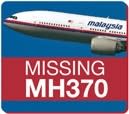Batteries on MH370 safe and complied with aviation regulations, says MAS
Following reports that a shipment of lithium-ion batteries was part of the cargo on board MH370, Malaysia Airlines has issued a statement today to clarify that the lithium-ion batteries were safe and complied with aviation regulations.

The airlines said the shipment of lithium-ion batteries was in compliance with the International Civil Aviation Organisation (ICAO) and the International Air Transport Association (IATA) requirements, where it is classified as "non-dangerous goods".
The statement came after the online version of British tabloid Daily Mail speculated that the shipment of lithium-ion batteries on the missing flight MH370 could have caused a fire on board the aircraft.
The report said Malaysia Airlines chief executive officer Ahmad Jauhari Yahya admitted that the plane was carrying highly flammable lithium-ion batteries.
On March 17, Ahmad Jauhari had said at the daily press briefing that flight MH370 was transporting three to four tonnes of mangosteens to China, stressing that there was no dangerous cargo on board.
The latest admission has reignited speculation that a fire might be responsible for the plane's disappearance two weeks ago.
ICAO defines dangerous goods as articles or substances which are capable of posing a risk to health, safety, property or the environment. It had, in February 2013, prohibited the carriage of lithium-ion aircraft batteries as cargo on passenger planes.
The Mail Online report had said that lithium-ion batteries have caused 140 mid-air incidents in the last 20 years. They are commonly used in mobile phones and laptops.
According to the United States-based Federal Aviation Administration, lithium-ion batteries carried in the cargo or baggage have been responsible for more than 140 incidents between March 1991 and February 17, 2014, reports newsportal Malaysiakini.
In rare cases, aircraft have been destroyed as a result of fires started from the devices, although they had been cargo planes in both incidents, said the Mail Online.
In one case, UPS Airlines flight 6 crashed while attempting an emergency landing in September 2010 en route from Dubai to Cologne in Germany.
Billie Vincent, the former head of security for the US Federal Aviation Administration, said the revelation that flight MH370 was carrying lithium-ion batteries reaffirmed his belief that flames started in the cargo hold and destroyed the aircraft's communication systems and filled the cabin with toxic fumes, the Mail Online reported.
Vincent said this would have overwhelmed the passengers but may have given the pilots a chance to divert the aircraft for an emergency landing.
Lithium-ion batteries do have the ability to burst into flames, and while it is uncommon, when they ignite, they can cause an extreme fire.
Lithium-ion batteries are sensitive to high temperatures and heat can cause the battery packs to degrade much faster than they normally would.
Flight MH370 disappeared from the radar on March 8 en route to Beijing from the Kuala Lumpur International Airport with 290 people on board and so far, search teams from 26 nations have yet to locate any sign of the aircraft. – March 22, 2014.


